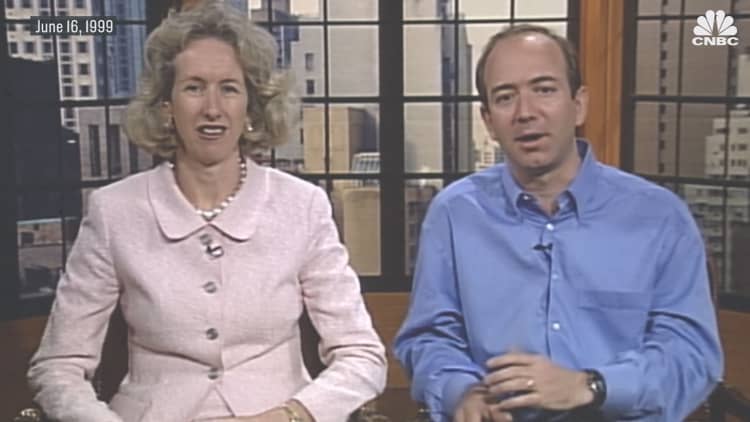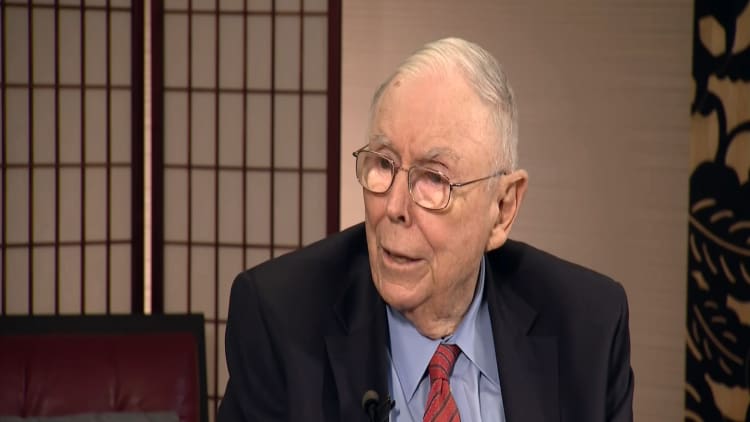In July 1994, Jeff Bezos filed the paperwork to launch a company he called Cadabra, Inc., a shortened version of the famous magician's expression, "abracadabra," according to the Seattle Times.
That name didn't last long, though, because Bezos' first lawyer, Todd Tarbert, informed Bezos that over the phone, "Cadabra" was often misheard as "Cadaver," Brad Stone writes in "The Everything Store: Jeff Bezos and the Age of Amazon."
A second option Bezos considered was Relentless. The Relentless.com URL still takes you to Amazon today. But Bezos' friends told him the name sounded "a bit sinister," Stone writes.
In October 1994, Bezos searched through the "A" section of the dictionary looking for company names, reasoning that would help his company come up first in alphabetical searches. That's when he found the name "Amazon," and marched into his Seattle garage where the company was launched and told employees he had picked a new name for the company.
"This is not only the largest river in the world, it's many times larger than the next biggest river. It blows all other rivers away," Bezos said, according to Stone.
TWEET: Jeff Bezos filed paperwork on July 5, 1994, to create Cadabra Inc. — as in abracadabra.
Over the next 25 years, Amazon would become the e-commerce behemoth we all now know, with a market capitalization of more than $950 billion.
In honor of the 25th anniversary of Amazon's founding, here are three of Bezos' best pieces of advice on how to be successful.
1. Have a vision, and organize your time 2 to 3 years out
"Vision is absolutely important, but it doesn't deserve your day-to-day attention," Bezos said at the Yale Club in New York City in February, according to a transcript from Business Insider.
You need a vision, of course, Bezos said, "but mostly your time should be spent on things that are happening today, this year, maybe in the next two or three years."
For example, at Amazon, quarterly financial results are determined by work put in years ago.
"We'll announce our Amazon quarterly results, and [people will say], 'Great quarter, congratulations!' And then I say, 'Thank you,'" Bezos said at the Yale Club. "But what I really think about is [how] that quarter was kind of baked and done two or three years ago, and right now the senior executives at Amazon are working on a quarter that's going to happen in 2021, 2022 — that kind of thing."
2. Get used to naysayers
No matter how successful you may become, you will not be immune to criticism.
"We would be very naïve to believe that we're not going to be criticized. That's just part of the terrain. You have to accept that," Bezos said in an interview with Axel Springer CEO Mathias Döpfner, published by Business Insider in 2018.
"One thing that I tell people is ... if you're going to do anything new or innovative, you have to be willing to be misunderstood. If you cannot afford to be misunderstood, then for goodness' sake, don't do anything new or innovative."
Bezos faced resistance when he first thought to leave his Wall Street job and start Amazon. He was a senior vice president at the hedge fund D.E. Shaw before he'd turned 30 years old, and he had "a brilliant boss that I much admired," he said in the commencement speech he delivered at Princeton in 2010. Bezos explained to his boss that he wanted to sell books online.
"He took me on a long walk in Central Park, listened carefully to me, and finally said, 'That sounds like a really good idea, but it would be an even better idea for someone who didn't already have a good job,'" Bezos recalled.
Although the advice was sound, Bezos was, in the end, proud of his decision to take the risk.
"That logic made some sense to me, and he convinced me to think about it for 48 hours before making a final decision. Seen in that light, it really was a difficult choice, but ultimately, I decided I had to give it a shot," Bezos said in his commencement speech. "I didn't think I'd regret trying and failing. And I suspected I would always be haunted by a decision to not try at all. After much consideration, I took the less safe path to follow my passion, and I'm proud of that choice."

3. Take time to be inefficient
Being efficient is part of Amazon's DNA.
But Bezos also places great importance on time spent being inefficient, especially when that means wandering off the beaten path to explore your curiosity.
"From very early on in Amazon's life, we knew we wanted to create a culture of builders — people who are curious, explorers. They like to invent," Bezos said in his annual letter to shareholders published in April.
"They see the way we do things as just the way we do things now. A builder's mentality helps us approach big, hard-to-solve opportunities with a humble conviction that success can come through iteration: invent, launch, reinvent, relaunch, start over, rinse, repeat, again and again. They know the path to success is anything but straight."
It's the inefficient time that often results in discovering the next big thing.
"Sometimes (often actually) in business, you do know where you're going, and when you do, you can be efficient. Put in place a plan and execute," Bezos said.
"In contrast, wandering in business is not efficient … but it's also not random. It's guided — by hunch, gut, intuition, curiosity, and powered by a deep conviction that the prize for customers is big enough that it's worth being a little messy and tangential to find our way there.
"Wandering is an essential counter-balance to efficiency," he said. "You need to employ both. The outsized discoveries — the 'non-linear' ones — are highly likely to require wandering."
This story has been updated.
See also:
The majority of billionaires in the world are self-made
How Amazon founder Jeff Bezos went from the son of a teen mom to the world's richest person

Like this story? Subscribe to CNBC Make It on YouTube!


